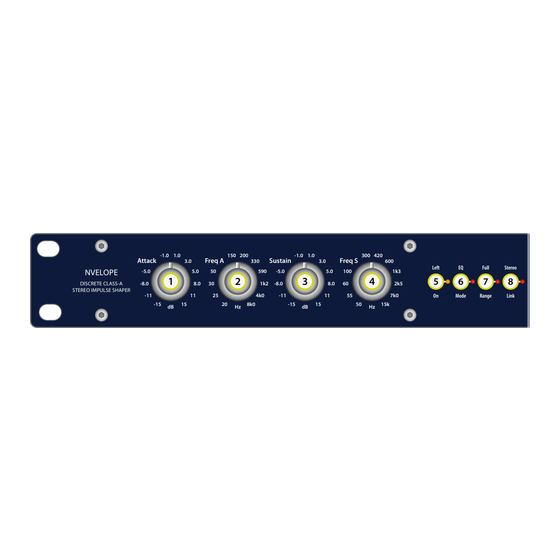
Table of Contents
Advertisement
Advertisement
Table of Contents

Summary of Contents for elysia nvelope
- Page 1 nvelope...
- Page 2 Precautions WARNING: High Voltage • Risk of electric shock. • Do not open chassis. • Refer service to qualified service staff only. • Before connecting the device to the main power supply, check if the right voltage is selected. • Replace fuse with the same type and value only.
-
Page 3: Table Of Contents
Welcome to the world of impulse shaping! The nvelope is capable of making subtle or drastic changes to a sound by providing control over its attack and sustain characteristics. This is very useful for reshaping individual tones, and is a wonderful tool in any mix- ing situation as well. -
Page 4: Controls
Controls -1.0 -1.0 Attack Freq A Sustain Freq S Left Full Stereo NVELOPE -5.0 -5.0 -8.0 -8.0 DISCRETE CLASS-A STEREO IMPULSE SHAPER Mode Range Link Attack • Full Range & Dual Band Mode: Raises or reduces the attack of a signal •... - Page 5 -1.0 -1.0 Attack Freq A Sustain Freq S -3.0 -3.0 Right Full Auto -5.0 -5.0 -8.0 -8.0 Mode Range Gain On (Left/Right) Activates a channel or switches to hardwire bypass EQ Mode Switches from envelope processing to EQ function Full Range Switches from Dual Band to Full Range operation Stereo Link Links both channels for processing stereo sources...
-
Page 6: Connectors
Connectors OUT R IN R OUT L IN L nvelope RISK OF ELECTRIC SHOCK serial number DO NOT OPEN EXT 2 OUT R IN R AVIS: RISQUE DE CHOC ÉLECTRIQUE - NE PAS OUVRIR EXT 1 OUT L IN L... -
Page 7: The Magic
The nvelope is a great tool for shaping individual signals, but it can be an indispensable resource in mixing situations as well, as it effortlessly helps you to bring a sound to the front with more attack and less sustain…... -
Page 8: Full Range Mode
Attack Freq A Sustain Freq S Attack Freq A Sustain Freq S -3.0 -3.0 Left Full Stereo Right Full Auto NVELOPE -5.0 -5.0 -5.0 -5.0 DISCRETE CLASS-A -8.0 -8.0 -8.0 -8.0 STEREO IMPULSE SHAPER Mode Range Link Mode Range Gain Linked Full Range -1.0... -
Page 9: Dual Band Mode
Attack Freq A Sustain Freq S Attack Freq A Sustain Freq S -3.0 -3.0 Left Full Stereo Right Full Auto NVELOPE -5.0 -5.0 -5.0 -5.0 DISCRETE CLASS-A -8.0 -8.0 -8.0 -8.0 STEREO IMPULSE SHAPER Mode Range Link Mode Range Gain Linked Dual Band -1.0... -
Page 10: Eq Mode
Gain Unlinked EQ EQ Mode In EQ mode, the nvelope becomes a two band equalizer with a high/low shelf characteristic, and even here the channel link for processing stereo material can be activated. Freq A now sets the frequency of the high shelf filter, while Attack deter- mines the amount of cut (turn left) or boost (turn right) in this band. -
Page 11: Mixed Mode
EQ (L) & Dual Band (R) Mixed Mode When the nvelope is not in Stereo Link mode, the two individu- al channels can be used as different processors simultaneously. For example, you can shape one signal in Dual Band mode in channel L and a completely different signal in Full Range mode in channel R. -
Page 13: Technical Details
Input impedance: 10 kOhm Output impedance: 68 Ohm CE Conformity elysia GmbH, Ringstraße 82, 41334 Nettetal, Germany, de- clares with sole responsibility that this product complies with the following norms and directives: • 2006/95/EG Low Voltage Directive (formerly 73/23/EWG or 93/68/EWG) •... -
Page 14: Warranty Info
Warranty Info The nvelope is covered by a limited warranty for a period of 2 years against defects in parts and labor from the date of purchase. Natural wear is not covered by this warranty. Repairs or replacements will not extend the warranty period. -
Page 15: Legal Info
GmbH. Other product and brand names contained in this document are used for iden- tification purposes only. - Page 16 GmbH Ringstraße 82 41334 Nettetal Germany +49 2157 126040 info@elysia.com...

Need help?
Do you have a question about the nvelope and is the answer not in the manual?
Questions and answers